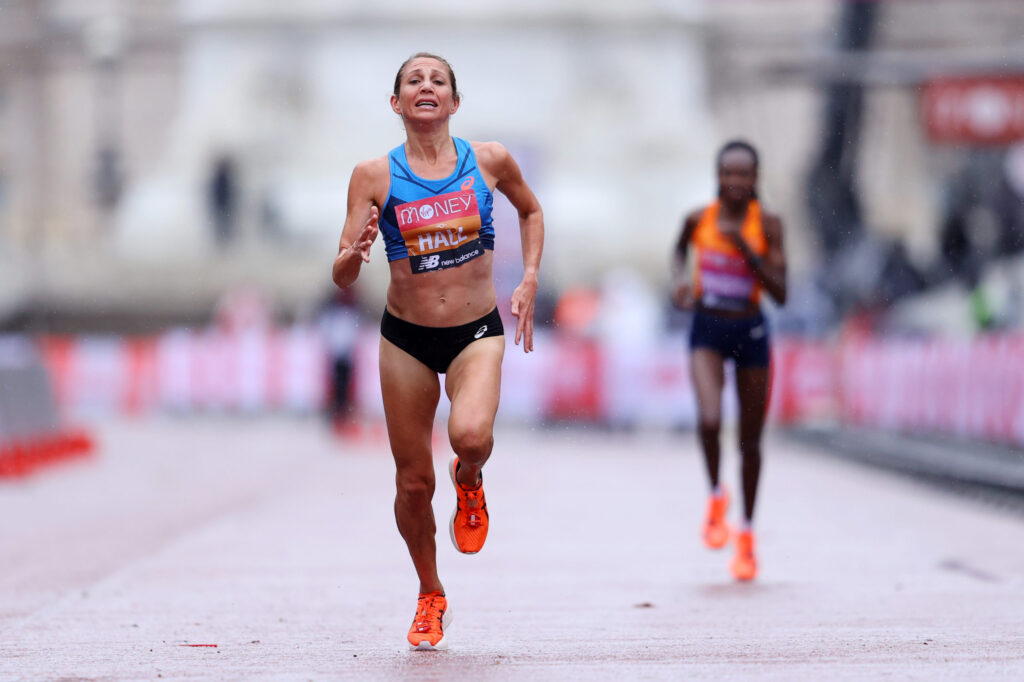Last year was the most challenging stretch of Sara Hall’s running career. From being favored to make the Tokyo Olympic marathon team to dropping out at mile 22 of the U.S. Trials in Atlanta, Hall, then 37, wondered if she’d ever have another chance to redeem herself.
“Everything was canceled,” Hall says of the weeks following that disappointing race in February of 2020.
Overnight, the world shut down. With a global pandemic on the rise, Hall was left without any future races to erase the painful setback. “I really had to cultivate a love for the process,” she says. “I’ve always loved the grind of the hard work, but I had to just focus on today and enjoying today, instead of wondering if I’m ever going to use it towards a race goal.”
Fast forward eight pandemic months to a sunny December day in Chandler, Ariz., when the perfect opportunity for redemption finally presented itself.
Clocking a time of 2:20:32 at The Marathon Project, Hall raced her way into the record books to become the second-fastest marathoner in the U.S., nearly eclipsing Deena Kastor’s record set in 2006. With her gutsy first-place finish, Hall shaved almost 90 seconds off of her previous best of 2:22:01, which she ran just 11 weeks earlier at the London Marathon.
“I didn’t realize I had so much room to grow my aerobic capacity,” Hall says of her performance. “I kept trying longer distances and I kept having surprising success.”
But Hall’s success isn’t surprising. A seven-time Olympic Trials qualifier with ten U.S. titles from the mile to the marathon, Hall can both tackle speedier races on the track and thrive in much longer road races. A “jack-of-all-trades,” as she’s known among elite runners, Hall says one key element has allowed her to experiment with different distances — time.
Hall was a seven-time All-American and star at Stanford University. She credits her early coaches and teammates for helping her develop a healthy balance between training and nutrition. While many young runners struggle with the destructive cycle of under-fueling and overtraining, which often leads to severe burnout or bouts of career-ending injuries, the guidance Hall received at a young age has allowed her to stay healthy on and off the track.
Now, as a 38-year-old elite marathoner, fueling her body to support the intensity of every performance is vital to achieving longevity in her sport.
Hall says her top nutritional goal is to consume enough food to sustain each training session. In season, she regularly runs a full marathon on the weekends as part of her training. So, getting the proper fuel can make or break her workouts.
Hall also focuses on minimizing the sugar in her diet because of its inflammatory impact. Since becoming a marathoner, Hall believes her diet has become a lot “simpler,” centered on organic foods such as vegetables, starches like rice or pasta and grass-fed meats.
“Both really intense track training and longer marathon training generates a lot of inflammation,” Hall says. “The more you can counteract that with your diet, the better you can handle that training.”
The number one thing she says she gets asked at running events or expos is: “Sara, what do you eat before you run?”
The answer, she says, is UCAN. From fueling her fastest marathons to providing the perfect pre- or post-workout snack, UCAN is like a “nutritional insurance” that releases slowly, so Hall doesn’t feel depleted at the end of a 15-mile run.
“You need not only to fuel well to finish that effort, but you also need to fuel enough to recover quickly,” Hall says. “UCAN has been a great tool for that.”
As far as her favorites go, Hall says she enjoys the Cocoa Energy + Protein Powder and the Cherry Berry Almond Bar.
“It’s a game-changer, honestly,” says Dr. Cathy Yeckel, an Assistant Clinical Professor at the Yale School of Medicine and a nutritional consultant for UCAN. “It’s really a struggle to figure out, ‘How do I eat nutritionally and helpfully, but still fit in the training?’ The beauty of UCAN products is they completely take the guesswork out of it.
“There is so much potential just with having something that’s not going to throw your metabolism off.”
In January of 2021, Hall faced a different type of obstacle. She tested positive for COVID-19, forcing her to pump the breaks on her training. Along with her family, who was also sick, she recovered. The trouble, however, was the fatigue she experienced following the illness.
“I was set back by fatigue for months,” she says. “But I’ve learned how to pick myself back up and just take it day by day.”
Hall posted about her struggle with the virus on Instagram following the 10,000-meter race at the U.S. Olympic Trials in Eugene this past July. She had competed in the trials hoping to complete her 17-year quest to make Team USA. In the end, Hall placed sixth.
“I didn’t make the team, but even to be in contention, there was a victory in that and how much I’ve overcome all year,” she says.
This month, Hall competed in the USATF 10 Mile Championships, hosted at the Cherry Blossom 10 Miler in Washington, D.C. (and rescheduled from its usual April date because of COVID-19). Hall, the three-time defending champion in the race and favorite to win, crossed the line in sixth place. On Instagram, Hall wrote that it was a “rough one,” but she isn’t letting the disappointment distract her from the next challenge — the Chicago Marathon on Oct. 10.
“I’ve learned that I don’t need to take confidence from a race like that because I know how I’m training,” she says. “As far as looking ahead to Chicago, I know I’ve put in the work for the marathon. I’ve been focusing on that moment and what I’m doing in training is all pointing to that.”
Poised to kick off another standout marathon season, Hall is now vying to become the American marathon record-holder. This year’s Chicago Marathon will mark the long-awaited return of the event since it turned virtual during the coronavirus pandemic last year.
As for her future plans, Hall says she would never have guessed she’d still be running at the professional level right now. But as long as she continues to make improvements, she’s not going anywhere.
“I always want to compete because I love it. I’m a competitive person,” she says. “But I might transition to the trails or ultras — who knows?”
Brenley Goertzen is a contributing writer at Just Women’s Sports. Follow her on Twitter @BrenleyGoertzen.
(Editor’s note: UCAN is a sponsor of Just Women’s Sports)

